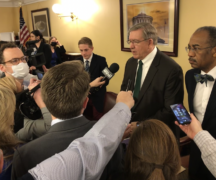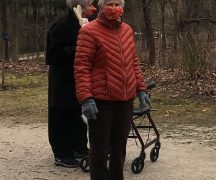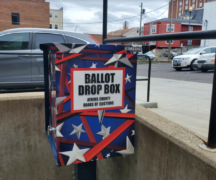Wednesday marks the 24th anniversary of the Ohio Supreme Court ruling the state’s school funding model is unconstitutional. Twenty-four years later, the Ohio legislature has yet to fix it.
Yet less than 24 hours after Gov. Mike DeWine vetoed a bill to allow lawmakers to strike down public health orders, GOP supermajorities mobilized to override this veto. State Sen. Theresa Gavarone, R-Bowling Green, and State Rep. Haraz Ghanbari, R-Perrysburg, both co-sponsors of the legislation, voted in favor of the override.
Senate Bill 22 will thereby go into effect three months from now. DeWine has expressed hope that Ohio’s health orders such as the mask mandate will already be removed by then, with COVID-19 cases on the decline and vaccines now eligible for the entire adult population.
Senate President Matt Huffman, R-Lima, told reporters on Wednesday that he too hopes the orders will be removed by the time SB 22 is in effect. If not, he said, members may eventually look at which COVID-19 orders are still active and determine if votes to rescind them are necessary.

As with the original passage of SB 22, the Wednesday override votes in the Ohio House of Representatives and Ohio Senate fell mostly upon party lines. All the votes to override came from Republicans, who have criticized the state response to COVID-19 as being too heavy-handed and not adequately involving the legislature in pandemic decision-making.
The Senate vote was 23-10, with two Republicans joining Democrats in voting no. The House vote was 62-35, with one Republican joining Democrats in voting no.
Republicans applauded on the House floor when the announced vote tally made the override official.
SB 22 includes a number of provisions targeting the authority of the governor, Ohio Department of Health and local health departments to respond to a public health crisis:
- Through passing a concurrent resolution, the legislature can rescind public health orders; state of emergency declarations; and any other executive branch order/rule issued in response to an emergency declaration.
- These orders/declarations can be rescinded as early as the same day they are issued.
- The executive branch cannot reissue a rescinded order for at least 60 days
- Limits state of emergency declaration to 30 days, requiring legislature approval to extend it.
- Limits local boards of health from issuing widespread quarantine orders or any other orders that generally impact schools and businesses.
- Local boards of health can only issue a quarantine/isolation order to individuals who have been diagnosed with a disease or have come in contact with someone who has.
State Sens. Terry Johnson, R-McDermott, and Rob McColley, R-Napoleon, are the main sponsors of Senate Bill 22 and both spoke in favor of the override votes on Wednesday.
“It’s time for us to stand up for the legislative branch. It’s time for us to reassert ourselves as a separate and co-equal branch of government here in the state of Ohio,” McColley said.
A number of Democrats spoke out against the bill, saying that decision-making power should rest in the hands of health experts.
House Minority Leader Emilia Strong Sykes, D-Akron, asserted on the House floor that Republican legislators are “not good at public health.”
“I can tell, as you’re smirking at me not wearing a mask, you are not good at public health,” Sykes said. This is not your lane, you need to get out of it.”
DeWine and health officials view this legislation as tying the hands of government to respond quickly to a fast-developing crisis such as a pandemic. Two-dozen county and city health departments in Ohio publicly opposed SB 22.
Dr. Mark Cameron, an immunologist with Case Western Reserve University, said the enactment of SB 22 could negatively impact future responses to public health crises.
“Despite the missteps, we now know how to stop the next COVID … The passing of this bill could very well cause us to stumble out of the gates again,” Cameron opined.
In testifying against the bill last month, Ohio Department of Health chief medical officer Dr. Bruce Vanderhoff said an “emergency response must be nimble and public health officials must have the ability to react to rapidly changing conditions as they happen.”
Sen. Nickie Antonio, D-Lakewood, echoed that point ahead of the vote.
“How in the world would a group of legislators come together with all different opinions, listening and believing all different information from science, to make a decision in a quick fashion dealing with an emergency? I just don’t think it would be possible. I think this is dangerous,” she said.

DeWine has also pointed to an analysis from the nonpartisan Legislative Service Commission, which concluded that SB 22 may be unconstitutional and thus could face legal challenges. Bill supporters in the legislature disagree with that assessment.
Majority Floor Leader Bill Seitz, R-Cincinnati, said he views the bill to be constitutional and argued there are many other states which allow their legislatures to rescind governors’ orders through joint resolutions.
Seitz said he takes issue with some other portions of the bill, namely the limitations on local quarantine orders. He suggested this could be fixed with future legislation, adding that the broader need for checks and balances led him to support the bill.
Ohio Capital Journal reporter Jake Zuckerman contributed to this story.
***
Ohio gets $3 billion in federal school reopening funds
The U.S. Department of Education announced they would be releasing federal funds directed at school reopening on Wednesday.
Of the $81 billion being released to states Wednesday as part of the latest stimulus relief fund, Ohio was slated to receive nearly $3 billion in funds made available Wednesday. READ MORE
Local control, or killing renewables? Bill sparks debate
A bill that would allow neighbors to block wind turbines and solar arrays in the rural corners of Ohio is sparking an intense debate over land owners’ rights and local control.
Two bills are making their way through the legislature that would allow small groups of citizens to block solar and wind farms after they’re already permitted.
“People have a right to know how these projects are going to affect their landscape,” one of the sponsors, Sen. Rob McColley, R-Napoleon, said in a February statement announcing the legislation, Senate Bill 52. “This is not a universal blockage of these projects, but is simply giving the community a voice and ensuring their opinions are heard.”
Under the legislation, if the Ohio Power Siting Board permits a big solar array or wind turbine that is at least partly in an unincorporated part of a township, a petition can be gotten up to call an election on whether to block it. The petition only requires a number of voter signatures equal to at least 8% of the ballots cast in the unincorporated area in the most recent gubernatorial election. READ MORE
After a week of gun violence, House Republicans seek to expand concealed carry
After a spate of seven mass shootings around the U.S. in seven days, Ohio House Republicans introduced legislation that would allow Ohioans aged 21 and older to carry a concealed weapon without a license.
House Bill 227, introduced Tuesday by Republican Reps. Thomas Brinkman and Kris Jordan and co-sponsored by 20 more, also contains other gun rights expansions including:
- Removing the requirement that licensed gun owners “promptly” notify a police officer during a stop that they have a weapon in the car. They would only need to tell the officer about the weapon if asked.
- Creating an expungement system for people previously convicted of concealed weapons offenses
Under current law, Ohioans must seek licensure from their local sheriff to lawfully carry a concealed weapon. They must complete eight hours of firearms training and complete a criminal background and mental competency checks. READ MORE
HELP OHIO CAPITAL JOURNAL GROW Make a tax-deductible donation.





